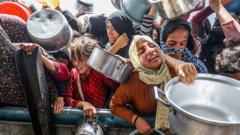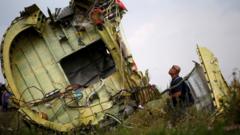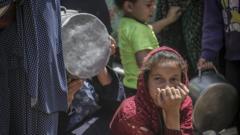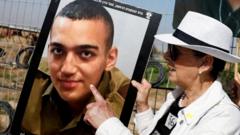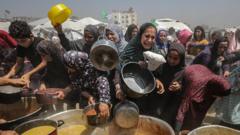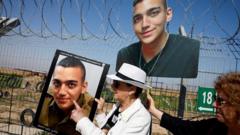In an emotional report, a BBC cameraman recounts a recent Israeli strike on a Gaza hospital while highlighting the dire situation of malnourished children, particularly focusing on the case of a five-month-old girl named Siwar Ashour.
Cameraman's Struggle in Gaza: Capturing the Tragedy of War and Malnourished Children
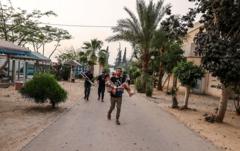
Cameraman's Struggle in Gaza: Capturing the Tragedy of War and Malnourished Children
The realities of conflict unfold as a BBC cameraman documents Israeli airstrikes amid the suffering of Gaza's children.
The ongoing conflict in Gaza reveals the devastating impact on its most vulnerable citizens, especially children. A BBC cameraman stationed in Gaza faced significant danger while capturing the stark realities of war. On Tuesday, he became a casualty of an Israeli airstrike that targeted the car park of the European Hospital in Khan Younis, resulting in both injuries and loss of life among civilians. While the journalist emerged with minor injuries, the attack drew a cloud over the ongoing humanitarian crisis.
The Israeli military claims that the airstrike was aimed at a Hamas command center allegedly located under the hospital. They justified their actions by asserting that Hamas is exploiting civilians as shields. However, Hamas disputed these claims, further complicating the narrative. At the moment of the strike, families gathered at the hospital to evacuate sick children and wait for others returning home from medical treatments abroad. This heartbreaking scenario included one father who suffered injuries from the bombing, and harrowing footage captured the cameraman attempting to comfort his frightened children amid the chaos.
One of the most poignant aspects of the coverage has been the plight of severely malnourished children, particularly highlighting five-month-old Siwar Ashour. With deep concern for her health, her mother, Najwa, sent a video message from Nasser Hospital. In it, she expressed her overwhelming love and desire for Siwar to receive the proper medical treatment to help her regain strength and health. The urgent situation is exacerbated by a severe gastrointestinal condition that prevents Siwar from digesting standard food, leaving her reliant on a special milk formula. Fortunately, medics have recently managed to procure a supply of the specific formula that Siwar needs.
Beyond Siwar's story, many families are trapped in Gaza amidst uncertainty. Interviews with mothers like Asma Al-Nashash reveal the anguish of feeling helpless as loved ones remain in dangerous conditions, facing scarcity of food and resources. Asma's emotional struggle is palpable as she reflects on her yearning to return to a secure and thriving environment.
This troubling narrative showcases the grave circumstances faced by those in Gaza, and how the eyes of journalists bear witness to such suffering in real-time. As the conflict continues, the urgent needs of civilians, particularly children, remain at the forefront of the humanitarian crisis.





